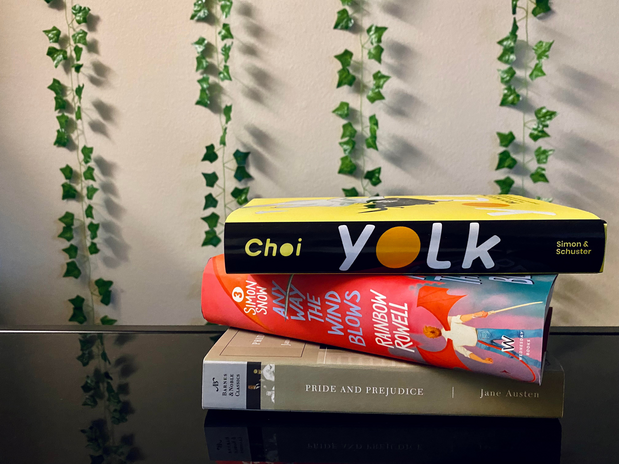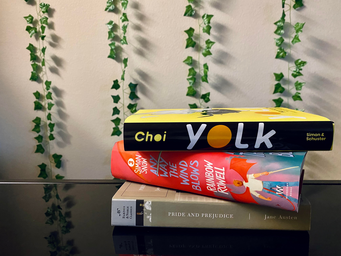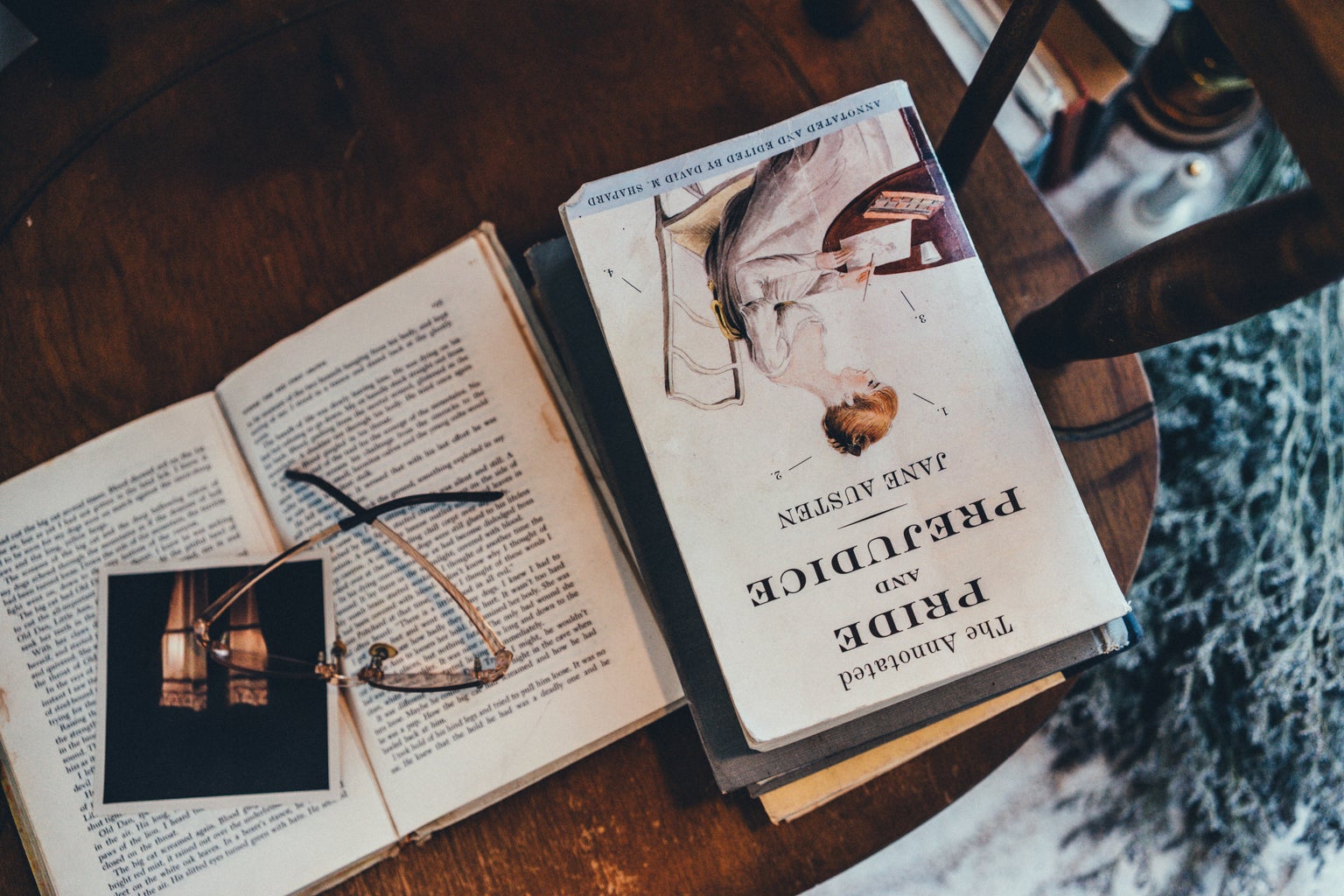During the fall, nothing feels better than curling up with a good book and a cup of coffee. For me, what really enhances the reading experience is being able to delve into a story with characters or plots that are relatable. Here are five books with timeless themes and interesting characters that I think college students like you should be able to connect to:
- Again, but Better by Christine Riccio
-
“Pilot nods with a small smile. ‘I’ve noticed.’
‘Noticed what?’ I ask with a smidge of attitude.
‘You’re bolder than before.'”Again, But Better follows Shane, a stellar pre-med student and every parent’s dream child but also a girl with a lot of regrets. For her, college life has always been about going to class and making her parents happy, but this has left her with no friends and a longing for something more. Shane knows her time in college is running out, so she signs up for a semester abroad in London, where she finds new relationships, discovers a different passion, and grapples with the self-doubt that comes with stepping outside of her bubble.
This book stands as a reminder that it’s never too late to start something new. It’s for all of the young adults who feel like they’re behind, in life and in love. For me, it’s refreshing to see a character who’s in her twenties still struggling to figure things out. A lot of young adult fiction is from the perspective of a high schooler, so I find it comforting to read about a girl who’s in the same place in life as I am. College comes with its unique struggles, and Again, But Better begins to tackle some of that.
- Yolk by Mary H.K. choi
-
“It’s crazy how lonely it is to be in a family.”
June and Jayne Baek are two sisters with nothing in common. June is the “put-together” older sister with a fancy finance job and an even fancier apartment. Jayne is a fashion school student just trying to make it through the day. Both sisters are living in New York, but they don’t want anything to do with each other — until June gets cancer and Jayne learns she’s the only one who can help her. All of a sudden, the estranged sisters’ lives crash together, and the two must learn to navigate not just June’s cancer treatment but also their family secrets.
Without focusing on college or academia, Yolk is able to capture one angle of life as a college student: it shows how difficult and lonely it is to be on your own. It also shows the significance of family during this chapter of your life. Even though college is a time where you move away from home, Yolk shows that family follows you wherever you go. Choi demonstrates the beautiful power of love and reconciliation and she reminds us that there are relationships we must cherish, even if that person drives you a little crazy.
- Any Way the Wind Blows by rainbow rowell
-
“I can touch you less gently, but I won’t love you less kindly.”
Any Way the Wind Blows is the final book in Rowell’s Simon Snow trilogy, so spoilers ahead. In Carry On, Simon fulfilled his destiny by defeating the greatest threat to the World of Mages. In Wayward Son, Simon and his friends embarked on a road trip full of vampires and introspection. Now, in Any Way the Wind Blows, Simon and his friends must learn how to move forward to the next chapter of their lives. So much has changed since their school days at Watford, and Simon, who lost his magic in Carry On, contemplates his place in the World of Mages and his relationship with Baz.
Any Way the Wind Blows is a fantasy novel, but peel away the magic and you’ll see the book also deals with self-doubt, intimacy and trauma; themes that we, as college students, can relate to. Most of us aren’t growing dragon wings or getting kidnapped by numpties, but I’m sure a lot of us can connect with Simon’s imposter syndrome. Simon goes from being the most powerful mage in the world to having no magic at all, and he can’t help but feel like he doesn’t belong with his mage friends. Any Way the Wind Blows also addresses that slump in your life where you’ve fulfilled all that you needed to do only to be left with the question, “What’s next?” Maybe that’s how you’re feeling as your college years come to an end, but Rowell reminds us that there’s always more to the story, even if we don’t know what’s on the pages just yet.
- pride and prejudice by jane austen
-
“There are few people whom I really love and still fewer of whom I think well. The more I see of the world, the more am I dissatisfied with it; and every day confirms my belief of the inconsistency of all human characters, and of the little dependence that can be placed on the appearance of merit or sense.”
An absolute classic. Pride and Prejudice focuses on the protagonist, Elizabeth Bennett, and her character development and relationship with Mr. Darcy. As someone who makes hasty, snap judgments about people, Elizabeth finds herself clashing with the proud and detestable Darcy for much of the novel. But eventually, she realizes he isn’t everything she’s made him out to be. Throughout the story, Austen also weaves in themes of class dynamics and family drama.
It’s not a novel set in our time, but Elizabeth is a spirited, witty woman that readers will find charming. Austen gracefully portrays a feminine character who is both intelligent and strong, and I’m all for strong female characters. Elizabeth shows that she has a gentle, romantic side, but she also shows that she’s blunt and stubborn about her beliefs — sometimes to a fault.
- pachinko by min jin lee
-
“Living everyday in the presence of those who refuse to acknowledge your humanity takes great courage.”
A National Book Award finalist, Pachinko, is an epic historical fiction novel about a Korean family that immigrates to Japan. The novel captures the struggles of living in 20th century Japan as a Korean. The family’s story begins in 1883 and ends over a hundred years later in 1989.
If you want more well-written female characters, Pachinko has a wealth of them, and each demonstrates their strength in their own ways. The characters in Lee’s novel face countless hardships not just as Koreans but as Korean women, and even the struggles of Japanese women are accounted for. Pachinko captures the cruelties of Japanese discrimination against Koreans and it stands as a poignant reminder that such hatred still exists in our own country. While it’s infuriating and unfortunate, there are people out there who will be able to relate to the xenophobia and racism that Pachinko explores. The novel demands that we pay attention to what’s wrong with our world, perhaps in the hopes that we’ll do something about it.
All of these stories deal with timeless themes and nuanced characters that we college students can relate to. For me, a book becomes special when it has something that I can really connect with. I hope these books also comfort, empower and entertain you.







